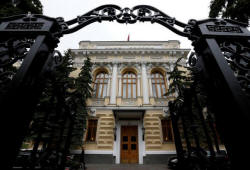|
Russian central bank cuts
rates, says economic recovery 'imminent'
 Send a link to a friend
Send a link to a friend
 [June 10, 2016]
By Jason Bush and Lidia Kelly [June 10, 2016]
By Jason Bush and Lidia Kelly
MOSCOW (Reuters) - Russia's central
bank cut its main lending rate on Friday for the first time in
almost a year, signaling confidence that inflation risks are
declining and describing an economic recovery as "imminent".
The rate cut comes at a time when Russia's economy, plagued in the
past few years by plunging oil prices and Western sanctions over the
Ukraine crisis, is now showing signs that the worst is behind it.
The bank cut the rate by a half-point to 10.5 percent, the first cut
since July 2015, an outcome predicted by a majority of analysts
although some had expected no change.
After declining by 3.7 percent last year, the economy now looks set
to begin growing again, helped by an unexpectedly strong rebound in
global oil prices and a plunge in inflation that is helping to
support living standards.
Explaining its decision, the bank said that it "notes the positive
trends of more stable inflation, decreased inflation expectations
and inflation risks against the backdrop of imminent growth recovery
in the economy".
The bank also said that it "will consider the possibility of a
further cut based on estimates for inflation risks and alignment of
inflation decline with the forecast trajectory".
The rouble strengthened after the decision, an unusual response as
lower interest rates normally make a currency less attractive to
hold.

But this factor appeared to be outweighed by the positive signals
the central bank sent about the health of Russia's economy more
generally.
"The market has interpreted the decision of the central bank
positively," said Sergey Romanchuk, head of forex and money markets
at Metallinvestbank.
"The central bank is conservative and if even it has decided to
lower rates in the current situation, it means its evaluation of the
prospects for economic growth and lower inflation are quite
reliable."
IMPROVING PROSPECTS
The rate cut and unusually bullish rhetoric from the central bank
testify to the improvement in Russia's economic prospects over
recent months as commodity prices rally and geopolitical tensions
ease.
Brent crude, an international benchmark for Russia's main export,
has recently hit eight-month highs above $50 per barrel, recovering
more quickly than expected from a 13-year low of $27 per barrel in
January.
Although Russia remains under Western sanctions, with little
expectation they will be lifted in the coming months, there are also
indications geopolitical tensions are diminishing.
Italian Prime Minister Matteo Renzi and EU Commission head
Jean-Claude Juncker will visit an economic summit in St Petersburg
next week in a tentative sign European leaders may be keen to
rebuild bridges to Russia.
[to top of second column] |

A view shows the Central Bank headquarters in Moscow, Russia, May
17, 2016. REUTERS/Sergei Karpukhin

In its statement, the central bank drew attention not only to declining
inflation but also to favorable economic growth trends.
It predicted that quarterly gross domestic product would begin rising in the
second half of 2016, with GDP expected to grow by 1.3 percent in 2017.
"Positive trends in the economy are not accompanied by a higher inflationary
pressure," the bank said, adding that recent macroeconomic indicators "confirm
greater sustainability of the Russian economy to oil price fluctuations".
There had been growing expectations the bank would cut rates as inflation has
fallen sharply over the last year and remained stable at 7.3 percent for the
last three months, a better-than-expected outcome that suggests the bank is on
track to meet its target of 4 percent inflation by the end of 2017.
Inflationary pressure has eased in part thanks to a rebound in the rouble,
helped by the recovery in global oil prices.
However, the central bank cautioned that although they had declined, risks it
would fail to meet its inflation target remained "at a heightened level".
It expressed concerns about the lack of a mid-term budget consolidation strategy
as well as uncertainty about wage and pension indexation, and the risk of
further volatility on global commodity markets.
"The materialization of these risks might cause a slowdown in the inflation
reduction," the central bank said, adding that a further rate cut would hinge on
whether inflation continued to fall.
(Reporting by Jason Bush, Lidia Kelly and Alexander Winning; Editing by
Christian Lowe)
[© 2016 Thomson Reuters. All rights
reserved.] Copyright 2016 Reuters. All rights reserved. This material may not be published,
broadcast, rewritten or redistributed.
 |